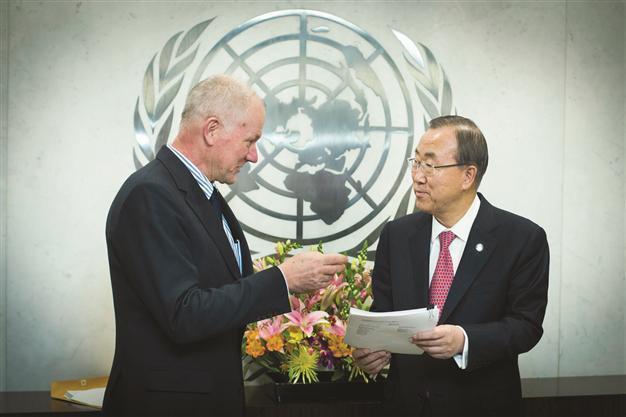UN confirms Syria chemical attacks
UNITED NATIONS

Sellstrom (L) hands his report over to UN Secretary-General Ban Ki-moon. REUTERS photo
Chemical weapons were probably used in four locations in Syria this year, in addition to the confirmed attack near Damascus in August that forced the government to abandon its secret chemical stockpile, U.N. inspectors have said.In a report released Dec. 12, the experts, led by Swedish professor Ake Sellstrom, examined seven alleged chemical weapons attacks and said it lacked information to corroborate the allegations at two locations. The inspectors’ limited mandate barred them from identifying whether the government or opposition fighters were responsible for any of the attacks.
The report said evidence indicated chemical weapons were probably used in Khan al Assal outside Aleppo, Jobar in Damascus’ eastern suburbs, Saraqueb near Idlib in the northwest, and Ashrafiah Sahnaya in the Damascus countryside. In two cases, it found “signatures of sarin.”
In an initial report on Sept. 16, Sellstrom’s team concluded that evidence collected in the Ghouta area of Damascus following an Aug. 21 attack provided “clear and convincing evidence that surface-to-surface rockets containing the nerve agent sarin were used.” Graphic video footage showed dozens of people gasping for air and bodies lined up and the U.S. government said more than 1,400 people were killed.
The experts said they collected “credible information that corroborates the allegations that chemical weapons were used in Khan al Assal on March 19, 2013 against soldiers and civilians.” But the inspectors said the release of chemical weapons at the site couldn’t be independently verified because it lacked “primary information” on how the chemical agents were delivered and because environmental and medical samples weren’t scientifically collected, preserved and analyzed.
Sellstrom handed his final report to U.N. Secretary-General Ban Ki-moon. The report was then sent to members of the U.N. Security Council. Ban said he would address the 193-member General Assembly about the report’s findings.
















